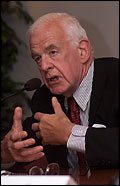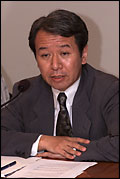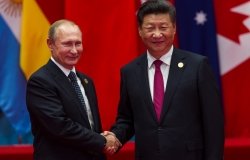Dealing With the New Japan
 By Amy McCreedy
By Amy McCreedy
In the words of former ambassador to Japan Thomas Foley, U.S.-Japan ties are in "pretty good shape, in some ways better than ever before." There is no reason for complacency, however, in a relationship of such significance to the United States: "The Chinese relationship is more dangerous and difficult, the British one is easier and more comfortable," but the Japanese relationship is the most important of all, the "key to doing anything else of meaning and purpose in Asia." Moreover, he pointed out, Japan and the United States make up 40 percent of the world's GDP, 40 percent of trade, and 40 percent of overseas development assistance.
 Foley was one of four distinguished panelists who participated in "New Perspectives on U.S.-Japan Relations," which was co-sponsored with the Japan Center for International Exchange (JCIE), and organized in cooperation with the Keizai Koho Center, Washington office. The lively discussion, moderated by JCIE president Tadashi Yamamoto, ranged from economics to politics to diplomacy. The participants offered candid advice to leaders in both Japan and the United States.
Foley was one of four distinguished panelists who participated in "New Perspectives on U.S.-Japan Relations," which was co-sponsored with the Japan Center for International Exchange (JCIE), and organized in cooperation with the Keizai Koho Center, Washington office. The lively discussion, moderated by JCIE president Tadashi Yamamoto, ranged from economics to politics to diplomacy. The participants offered candid advice to leaders in both Japan and the United States.
For example, Foley advised the Bush administration to avoid excessive use of gai-atsu, or pressure, to influence Japanese affairs. While bully tactics have proved effective in the past, Foley warned that a new wave of Japanese populism will cause such methods to backfire from now on. We must be "quieter and more tactful" to avoid stirring up anti-American resentment. Foley advocated close cooperation with Japanese groups who share our views. In other words, outside pressure (gai-atsu) will be largely useless unless combined with inside pressure (nai-atsu) from Japan's own citizens.
Gerald Curtis of Columbia University suggested that United States officials keep a steady focus on economic issues when Prime Minister Koizumi visits Washington in July. According to Curtis, the worst thing the Bush team could do is to waste precious time discussing "secondary issues" such as missile defense and revision of Article 9 (defense cooperation). Koizumi himself shows a weakness for getting sidetracked from the all-important topic of Japan's economic recovery.
Speculation on Japan's new administration was naturally a central theme of discussion, given the "Koizumi phenomenon" in Japan. However, while the prime minister gets an 85 percent approval rating from the Japanese public, he did not enjoy such popularity among the panelists. For example, Akihiko Tanaka of Tokyo University maintained that Koizumi is "not known for foreign policy expertise" and may not be up to the challenges of world statesmanship—luckily, the Asian situation has been relatively calm so far. Foley, in turn, expressed apprehension that Koizumi will become risk-adverse and "intoxicated" with popularity. All the panelists agreed, however, that Koizumi is not a right-wing nationalist in disguise, as some commentators have claimed.
Curtis was the hardest on the Koizumi administration, saying that "every passing day makes me more skeptical" about its abilities, although he admires Koizumi's candidly optimistic style ("what people are starved for"). According to Curtis, Koizumi is squandering a golden opportunity that will not come again—his popularity cannot possibly last, and the rival Hashimoto faction can only strengthen. Foley countered this saying that politicians tend to be cautious before elections and that Koizumi will probably be more active after the upper-house election in July. Foley pointed out that if rivals continue to gain strength, Koizumi still has some weapons in his arsenal. For example, he can dissolve the lower house or use the "nuclear weapon" of leaving the ruling party.
 In addition to their concerns with the prime minister, panelists also expressed serious doubts about Makiko Tanaka, Japan's first female foreign minister. Akihiko Tanaka was especially critical, maintaining that the Ministry of Foreign Affairs (MoFA) is "directionless, highly politicized and demoralized," partly because of the foreign minister's inexperience and incompetence. Indeed, she is "making a career out of bashing diplomats," and her statements often contradict those of Koizumi and other senior officials—as when she expressed skepticism about the United States' missile defense plan.
In addition to their concerns with the prime minister, panelists also expressed serious doubts about Makiko Tanaka, Japan's first female foreign minister. Akihiko Tanaka was especially critical, maintaining that the Ministry of Foreign Affairs (MoFA) is "directionless, highly politicized and demoralized," partly because of the foreign minister's inexperience and incompetence. Indeed, she is "making a career out of bashing diplomats," and her statements often contradict those of Koizumi and other senior officials—as when she expressed skepticism about the United States' missile defense plan.
According to Akihiko Tanaka, the foreign minister needs to study more and spend less time attacking subordinates. She is not entirely to blame for the politicization of MoFA, which began during the previous (Mori) administration. However, she has made a bad situation worse, to the point where MoFA is now completely "dysfunctional."
Takashi Kiuchi, advisor to Shinsei Bank, shifted the discussion to economics, and was more optimistic about Koizumi's abilities than any of the other panelists. He warned that U.S. leaders and negotiators must not expect a quick economic turnaround in Japan—but neither should they thereby conclude that Koizumi's administration is all talk and no action. Indeed, has Koizumi ever claimed that a recovery is imminent? On the contrary, he has emphasized the likelihood of short-term pain on the road to long-term economic health. According to Kiuchi, most Japanese economists support the prime minister enthusiastically, especially for his plans to slash public-sector enterprises and agencies that have been "choking off private sector dynamism for quite a while now."
At any rate, according to Kiuchi, the Japanese reform movement is bigger than any one person's political fortunes: "The reform process has become by now a self-feeding and irreversible process." The Japanese economy still faces enormous hurdles—for example, the construction and service sectors are struggling for survival—but overall, the trend is positive. Kiuchi believes that Americans should understand this and not have unrealistic expectations.
As the discussion wound down, all the panelists seemed to agree that Japan has fundamentally changed, no matter what happens to the current administration. Kiuchi pointed out that politicians are gaining meaningful control over the bureaucracy. For example, the bureaucrats in the Construction Ministry can no longer insist that gas tax funds go exclusively to road construction—such "irrationality" is becoming increasingly impossible. Gerry Curtis, too, emphasized how Japan's political machine, which has governed the country for decades, is at last running out of steam. For example, the system of backroom deals, in which the prime minister is chosen by ruling-party insiders, is gone forever. Most significantly, the public will no longer allow their representatives to drift in a state of "psychological denial," as throughout the 1990s. In the words of Gerry Curtis, Japan is "not the same country" as 10 years ago, and politicians who don't understand that are doomed to "terminal decline."
Related Program

Indo-Pacific Program
The Indo-Pacific Program promotes policy debate and intellectual discussions on US interests in the Asia-Pacific as well as political, economic, security, and social issues relating to the world’s most populous and economically dynamic region. Read more










